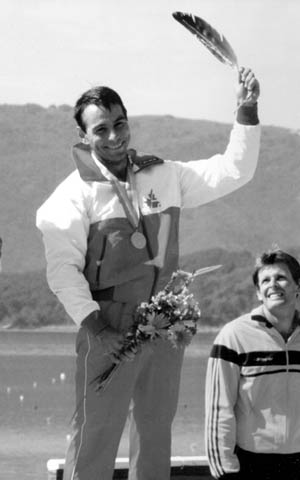|
Canku Ota |
|
(Many Paths) |
|
An Online Newsletter Celebrating Native America |
|
November 18, 2000 - Issue 23 |
|
|
|
Kayaker on Special Mission |
|
It was a giant step for Morris, who is most often remembered for a poignant gesture as he climbed atop the gold-medal podium with kayak partner Hugh Fisher as winners of the K2-1000 metres at the Los Angeles Olympics. Morris, a Mohawk who grew up on the reserve at Kahnawake, Que., raised a symbolic eagle feather over his head. The moment was personal, spiritual and not something every Canadian would understand. But last night, it was plain to all, the high place in Canadian sport that Morris and Fisher merited. They were ushered into the sport pantheon as peers of some truly great and beloved figures in Canadian sport -- no less than Wayne Gretzky, who dominated the hockey world; the Sandra Schmirler rink of Saskatchewan curlers who conquered the world, the Olympics and Canadian hearts (Jan Betker, Joan McCusker and Marcia Gudereit); Bruce Wilson, who earned a record 48 caps as an international soccer player in Canada's colours; and Dr. Thomas Pashby, the ophthalmologist whose pioneering work on helmets and faceguards saves the sight and lives of countless young Canadians. Morris works on saving lives of young Canadians in another way, promoting and developing sport for aboriginal athletes, helping raise levels of esteem, respect and accomplishment where there is too often despair. Since his days as an Olympian, Morris has been running programs for native youth at Kahnawake and nationally as a special attaché to the Secretary of State for Amateur Sport. He teaches children that if they are strong and proud and stand up for themselves, other people will see that pride and support them. "In the Aboriginal Sport Circle, we are working very hard to move the yardstick in terms of access to the sport system," Morris said before last night's induction at the Royal York Hotel. "It's a big task but we have some good leadership in the regional level. "We resurrected the Tom Longboat Award for top male and female aboriginal athletes in the country. Last year's winners were Darren Zack, one of the best fastball pitchers in the world and a world and Pan American champion, and Waneek Horn-Miller, co-captain of the Olympic women's water polo team. "In combination with the Canadian Coaching Association, we're putting together aboriginal coaching manuals," Morris said. "We see aboriginal athletes coming into the mainstream and it's important the coaches understand some of the cultural perspectives they bring in with them when they come to national teams. "Athletes from isolated areas or the far north may have long hair or a braid, like Chris Simon [Washington Capitals hockey player]. Sometimes that's viewed as unacceptable in a mainstream team environment, but it's part of their spiritual being. "The aboriginal athlete's culture is important. Some grew up in traditional families and coaches may be dealing with sunrise ceremonies, tobacco burning or sweetgrass burning before a game." Respect for aboriginals in sport is coming slowly. Last year at the Pan American Games in Winnipeg, there was a touching element during the opening ceremony when the Games flame was borne into Winnipeg Stadium by seven of the original nine aboriginal athletes who ran the 1967 Pan American flame to Winnipeg from Minneapolis -- before having to turn it over to a Canadian team athlete. The honour accorded Australian aboriginal athlete Cathy Freeman at the opening of the Sydney Olympics was something to be shared by aboriginals in all cultures, Morris said. "It was a spectacular moment for Australia and for indigenous people around the world. I was there a year before and there'd been a lot of debate about her carrying both the Australian and aboriginal flags. "What helps every athlete in every sport is the pride they bring with them. If it comes from the cultural background and it's important to them, that's what counts at the end of the day. The Sydney Olympics took us a step farther globally in respect for indigenous peoples." Aboriginal People Profiles-Alwyn Morris |
|
|
|
|
| Canku Ota is a free Newsletter celebrating Native America, its traditions and accomplishments . We do not provide subscriber or visitor names to anyone. Some articles presented in Canku Ota may contain copyright material. We have received appropriate permissions for republishing any articles. Material appearing here is distributed without profit or monetary gain to those who have expressed an interest. This is in accordance with Title 17 U.S.C. section 107. |
|
Canku Ota is a copyright of Vicki Lockard and Paul Barry. |
|
The "Canku Ota - A Newsletter Celebrating Native America"
web site and its design is the Copyright © 1999 of Paul C. Barry. |
 TORONTO
-- When Olympic gold-medal paddler Alwyn Morris was inducted into Canada's Sports Hall of Fame last week, it marked
one more step down the long trail to recognition for aboriginal athletes.
TORONTO
-- When Olympic gold-medal paddler Alwyn Morris was inducted into Canada's Sports Hall of Fame last week, it marked
one more step down the long trail to recognition for aboriginal athletes.